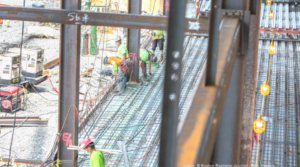By Catherine Carlock on September 22, 2020
The coronavirus pandemic has battered most of the U.S. economy, but the biotech sector has been a bright spot that’s likely to continue, according to panelists discussing a regional life-science outlook for commercial real estate organization CREW Boston.
JLL’s Kerry Hawkins moderated the online discussion between Doug Cuff, vice president of California-based life-science real estate company IQHQ Inc.; Audrey Symes, the director of research for health care, life sciences and advisory at JLL; and McKenna Teague, vice president at brokerage CBRE.
“2020 has shown the critical importance of the life sciences profession to our economy,” Symes said. “If you do want to invest in commercial real estate in the next 18 months, it’s hard for me to imagine a better subcategory.”
Boston’s Seaport District has grown to become the second-largest lab cluster in New England, behind Cambridge’s Kendall Square, Hawkins said. But other nodes of growth have emerged in Watertown, Somerville and further into South Boston toward Broadway, Teague said. There are many vacant storage warehouses or parking lots up the A and D street corridors in South Boston that could see redevelopment in the coming years, she said.
IQHQ, meanwhile, has placed its bet on Boston’s Fenway neighborhood and Cambridge’s Alewife, where it has recently purchased the 26.5-acre GCP Applied Technologies headquarters campus. The company has also recently acquired Innovation Park, a 200,000-square-foot campus in Andover. Potential tenants are looking to New Hampshire for an Innovation Park labor base, Cuff said.
“I’m impressed by how quickly we’ve seen demand up there,” he said.
IQHQ is updating Innovation Park’s café and gym with a focus on Covid-19 safety protocols.
“You can’t go into this blindly,” Cuff said. “You are trying to design an amenity system that works.”
Clustering is still important to biotech companies, many of which see frequent transitions between employees and rely on unplanned interpersonal interactions — a large part of why Kendall Square has been so successful, the panelists said. But there will be a push further out, particularly as available space in Kendall Square remains so scarce.
“The cluster effect is here to stay,” Teague said. “Watertown, Alewife, Seaport — they now have clusters. It’s not just Cambridge anymore.”
Read more via the Boston Business Journal >>

